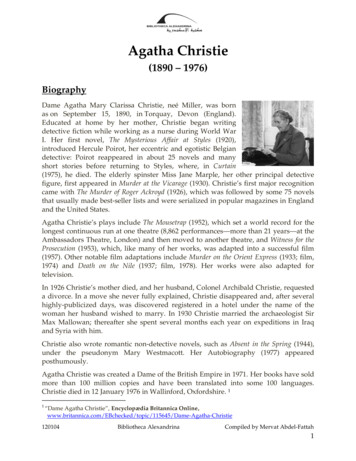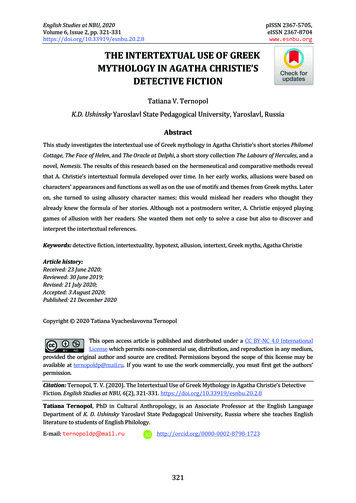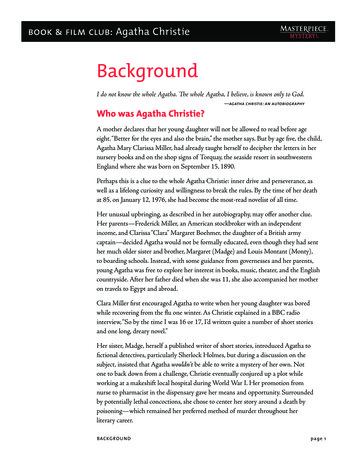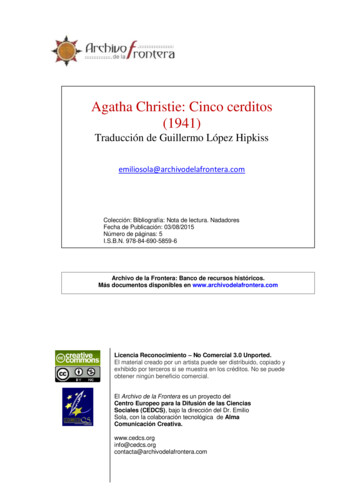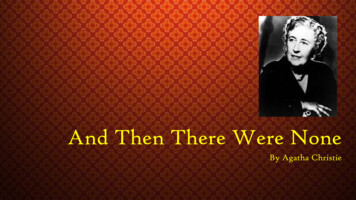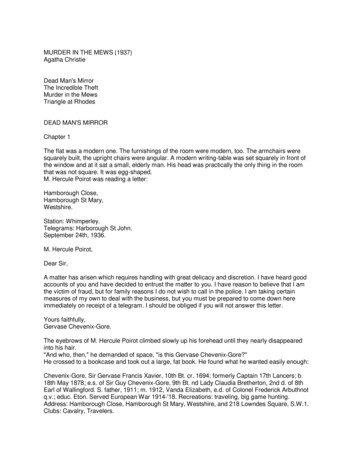
Transcription
THE HOLLOWAgatha Christie
Chapter 1At 6:13 a.m. on a Friday morning Lucy Angkatell's big blue eyesopened upon another day, and as always, she was at once wide awakeand began immediately to deal with the problems conjured up by herincredibly active mind. Feeling urgently the need of consultation andconversation, and selecting for the purpose her young cousin MidgeHardcastle, who had arrived at The Hollow the night before, LadyAngkatell slipped quickly out of bed, threw a negligee round her stillgraceful shoulders, and went along the passage to Midge's room.Since she was a woman of disconcertingly rapid thought processes,Lady Angkatell, as was her invariable custom, commenced theconversation in her own mind, supplying Midge's answers out of herown fertile imagination.The conversation was in full swing when Lady Angkatell flung openMidge's door."- And so, darling, you really must agree that the weekend is going topresent difficulties!""Eh? Hwah?" Midge grunted inarticulately, aroused thus abruptly froma satisfying and deep sleep.
Lady Angkatell crossed to the window, opening the shutters andjerking up the blind with a brisk movement, letting in the pale light of aSeptember dawn."Birds!" she observed, peering with kindly pleasure through the pane."So sweet.""What?""Well at any rate, the weather isn't going to present difficulties. It looksas though it had set in fine. That's something. Because if a lot ofdiscordant personalities are boxed up indoors, I'm sure you will agreewith me that it makes it ten times worse. Round games perhaps, andthat would be like last year when I shall never forgive myself aboutpoor Gerda. I said to Henry afterwards it was most thoughtless of me and one has to have her, of course, because it would be so rude to askJohn without her, but it really does make things difficult - and the worstof it is that she is so nice - really it seems odd sometimes that anyoneso nice as Gerda is should be so devoid of any kind of intelligence, andif that is what they mean by the law of compensation I don't really thinkit is at all fair.""What are you talking about, Lucy?""The weekend, darling. The people who are coming tomorrow. I havebeen thinking about it all night and I have been dreadfully botheredabout it. So it really is a relief to talk it over with you, Midge. You arealways so sensible and practical.""Lucy," said Midge sternly, "do you know what time it is?"
"Not exactly, darling. I never do, you know.""It's quarter past six.""Yes, dear," said Lady Angkatell, with no signs of contrition.Midge gazed sternly at her. How maddening, how absolutelyimpossible Lucy was! Really, thought Midge. I don't know why we putup with her!Yet, even as she voiced the thought to herself, she was aware of theanswer. Lucy Angkatell was smiling, and as Midge looked at her, shefelt the extraordinary pervasive charm that Lucy had wielded all herlife and that even now, at over sixty, had not failed her. Because of it,people all over the world, foreign potentates, A.D.Cs, Governmentofficials, had endured inconvenience, annoyance and bewilderment. Itwas the childlike pleasure and delight in her own doing that disarmedand nullified criticism. Lucy had but to open those wide blue eyes andstretch out those fragile hands, and murmur. "Oh! but I'm so sorry."and resentment immediately vanished."Darling," said Lady Angkatell, "I'm so sorry. You should have toldme!""I'm telling you now - but it's too late! I'm thoroughly awake.""What a shame. But you will help me, won't you?""About the weekend? Why? What's wrong with it?"
Lady Angkatell sat down on the edge of the bed. It was not, Midgethought, like anyone else sitting on your bed. It was as unsubstantialas though a fairy had poised itself there for a minute.Lady Angkatell stretched out fluttering white hands in a lovely,helpless gesture."All the wrong people coming - the wrong people to be together, Imean - not in themselves. They're all charming really.""Who is coming?"Midge pushed thick, wiry black hair back from her square foreheadwith a sturdy brown arm. Nothing unsubstantial or fairylike about her."Well, John and Gerda. That's all right by itself. I mean John isdelightful - most attractive. And as for poor Gerda - well, I mean, wemust all be very kind. Very, very kind."Moved by an obscure instinct of defence, Midge said:"Oh, come now, she's not as bad as that.""Oh, darling, she's pathetic. Those eyes. And she never seems tounderstand a single word one says.""She doesn't," said Midge. "Not what you say - but I don't know that Iblame her. Your mind. Lucy, goes so fast, that to keep pace with it your
conversation takes the most amazing leaps. All the connecting linksare left out.""Just like a monkey," said Lady Angkatell vaguely."But who else is coming beside the Christows? Henrietta, I suppose?"Lady Angkatell's face brightened."Yes - and I really do feel that she will be a tower of strength. Shealways is. Henrietta, you know, is really kind - kind all through, not juston top. She will help a lot with poor Gerda. She was simply wonderfullast year. That was the time we played limericks, or wordmaking, orquotations - or one of those things, and we had all finished and werereading them out when we suddenly discovered that poor dear Gerdahadn't even begun. She wasn't even sure what the game was. It wasdreadful, wasn't it, Midge?""Why anyone ever comes to stay with the Angkatells, I don't know,"said Midge. "What with the brainwork, and the round games, and yourpeculiar style of conversation, Lucy.""Yes, darling, we must be trying - and it must always be hateful forGerda, and I often think that if she had any spirit she would stay away but, however, there it was, and the poor dear looked so bewilderedand - well - mortified, you know. And John looked so dreadfullyimpatient. And I simply couldn't think of how to make things all rightagain - and it was then that I felt so grateful to Henrietta. She turnedright round to Gerda and asked about the pullover she was wearing really a dreadful affair in faded lettuce green - too depressing and
jumble sale, darling - and Gerda brightened up at once; it seems thatshe had knitted it herself, and Henrietta asked her for the pattern, andGerda looked so happy and proud. And that is what I mean aboutHenrietta. She can always do that sort of thing. It's a kind of knack.""She takes trouble," said Midge slowly."Yes, and she knows what to say.""Ah," said Midge. "But it goes further than saying. Do you know, Lucy,that Henrietta actually knitted that pullover.""Oh, my dear." Lady Angkatell looked grave. "And wore it?""And wore it. Henrietta carries things through.""And was it very dreadful?""No. On Henrietta it looked very nice.""Well, of course, it would. That's just the difference between Henriettaand Gerda. Everything Henrietta does she does well and it turns outright. She's clever about nearly everything, as well as in her own line. Imust say, Midge, that if anyone carries us through this weekend, it willbe Henrietta. She will be nice to Gerda and she will amuse Henry, andshe'll keep John in a good temper and I'm sure she'll be most helpfulwith David -""David Angkatell?"
"Yes. He's just down from Oxford - or perhaps Cambridge. Boys of thatage are so difficult - especially when they are intellectual. David is veryintellectual. One wishes that they could put off being intellectual untilthey were rather older. As it is, they always glower at one so and bitetheir nails and seem to have so many spots and sometimes an Adam'sapple as well. And they either won't speak at all, or else are very loudand contradictory. Still, as I say, I am trusting to Henrietta. She is verytactful and asks the right kind of questions, and being a sculptressthey respect her, especially as she doesn't just carve animals orchildren's heads but does advanced things like that curious affair inmetal and plaster that she exhibited at the New Artists last year. Itlooked rather like a Heath Robinson step ladder. It was calledAscending Thought - or something like that. It is the kind of thing thatwould impress a boy like David. I thought myself it was just silly.""Dear Lucy!""But some of Henrietta's things I think are quite lovely. That WeepingAsh tree figure for instance.""Henrietta has a touch of real genius, I think. And she is a very lovelyand satisfying person as well," said Midge.Lady Angkatell got up and drifted over to the window again. Sheplayed absentmindedly with the blind cord."Why acorns, I wonder?" she murmured."Acorns?"
"On the blind cord. Like pineapples on gates. I mean, there must be areason. Because it might just as easily be a fir cone or a pear, but it'salways an acorn. Mash, they call it in crosswords - you know, for pigs.So curious, I always think.""Don't ramble off, Lucy. You came in here to talk about the weekendand I can't see why you are so anxious about it. If you manage to keepoff round games, and try to be coherent when you're talking to Gerda,and put Henrietta on to tame the intellectual David, where is thedifficulty?""Well, for one thing, darling, Edward is coming.""Oh, Edward." Midge was silent for a moment after saying the name.Then she asked quietly:"What on earth made you ask Edward for this weekend?""I didn't, Midge. That's just it. He asked himself. Wired to know if wecould have him. You know what Edward is. How sensitive. If I'd wiredback 'No,' he'd probably never have asked himself again. He's likethat."Midge nodded her head slowly.Yes, she thought, Edward was like that. For an instant she saw his faceclearly, that very dearly loved face. A face with something of Lucy'sinsubstantial charm; gentle, diffident, ironic.
"Dear Edward," said Lucy, echoing the thought in Midge's mind.She went on impatiently:"If only Henrietta would make up her mind to marry him. She is reallyfond of him, I know she is. If they had been here some weekend withoutthe Christows. As it is, John Christow has always the mostunfortunate effect on Edward. John, if you know what I mean, becomesso much more so and Edward becomes so much less so. Youunderstand."Again Midge nodded."And I can't put the Christows off because the weekend was arrangedlong ago, but I do feel, Midge, that it is all going to be difficult, withDavid glowering and biting his nails, and with trying to keep Gerdafrom feeling out of it, and with John being so positive and dear Edwardso negative -""The ingredients of the pudding are not promising," murmured Midge.Lucy smiled at her."Sometimes," she said meditatively, "things arrange themselves quitesimply. I've asked the crime man to lunch on Sunday. It will make adistraction, don't you think so?""Crime man?"
"Like an egg," said Lady Angkatell. "He was in Baghdad, solvingsomething, when Henry was high commissioner. Or perhaps it wasafterwards? We had him to lunch with some other duty people. He hadon a white duck suit, I remember, and a pink flower in his buttonhole,and black patent leather shoes. I don't remember much about itbecause I never think it's very interesting who killed who. I mean oncethey are dead it doesn't seem to matter why, and to make a fuss aboutit all seems so silly.""But have you any crimes down here, Lucy?""Oh, no, darling. He's in one of those funny new cottages - you know,beams that bump your head and a lot of very good plumbing and quitethe wrong kind of garden. London people like that sort of thing.There's an actress in the other, I believe. They don't live in them all thetime like we do. Still," Lady Angkatell moved vaguely across the room,"I daresay it pleases them. Midge darling, it's sweet of you to havebeen so helpful.""I don't think I have been so very helpful.""Oh, haven't you?" Lucy Angkatell looked surprised. "Well, have a nicesleep now and don't get up to breakfast, and when you do get up, dobe as rude as ever you like.""Rude?" Midge looked surprised. "Why? Oh!" she laughed. "I see!Penetrating of you, Lucy. Perhaps I'll take you at your word."Lady Angkatell smiled and went out. As she passed the open bathroomdoor and saw the kettle and gas ring, an idea came to her.
People were fond of tea, she knew - and Midge wouldn't be called forhours. She would make Midge some tea. She put the kettle on and thenwent on down the passage.She paused at her husband's door and turned the handle, but SirHenry Angkatell, that able administrator, knew his Lucy. He wasextremely fond of her but he liked his morning sleep undisturbed. Thedoor was locked.Lady Angkatell went on into her own room. She would have liked tohave consulted Henry but later would do. She stood by her openwindow, looking out for a moment or two, then she yawned. She gotinto bed, laid her head on the pillow and in two minutes was sleepinglike a child.In the bathroom the kettle came to the boil and went on boiling."Another kettle gone, Mr. Gudgeon," said Simmons, the housemaid.Gudgeon, the butler, shook his grey head.He took the burnt-out kettle from Simmons and, going into the pantry,produced another kettle from the bottom of the plate cupboard wherehe had a stock of half a dozen."There you are, Miss Simmons. Her ladyship will never know.""Does her ladyship often do this kind of thing?" asked Simmons.
Gudgeon sighed."Her ladyship," he said, "is at once kind-hearted and very forgetful, ifyou know what I mean. But in this house," he continued, "I see to it thateverything possible is done to spare her ladyship annoyance orworry."Chapter 2Henrietta Savernake rolled up a little strip of clay and patted it intoplace. She was building up the clay head of a girl with swift practisedskill.In her ears, but penetrating only to the edge of her understanding, wasthe thin whine of a slightly common voice:"And I do think, Miss Savernake, that I was quite right! 'Really,' I said,'if that's the line you're going to take!' Because I do think, MissSavernake, that a girl owes it to herself to make a stand about thesesort of things - if you know what I mean. 'I'm not accustomed,' I said, 'tohaving things like that said to me, and I can only say that you musthave a very nasty imagination!' One does hate unpleasentness, but I dothink I was right to make a stand, don't you, Miss Savernake?""Oh, absolutely," said Henrietta with a fervour in her voice which mighthave led someone who knew her well to suspect that she had not beenlistening very closely.
"'And if your wife says things of that kind,' I said, 'well, I'm sure I can'thelp it!' I don't know how it is, Miss Savernake, but it seems to betrouble wherever I go, and I'm sure it's not my fault. I mean, men are sosusceptible, aren't they?" The model gave a coquettish little giggle."Frightfully," said Henrietta, her eyes half closed."Lovely," she was thinking. "Lovely that plane just below the eyelid and the other plane coming up to meet it. That angle by the jaw'swrong. I must scrape off there and build up again. It's tricky."Aloud she said in her warm, sympathetic voice:"It must have been most difficult for you.""I do think jealousy's so unfair, Miss Savernake, and so narrow, if youknow what I mean. It's just envy, if I may say so, because someone'sbetter looking and younger than they are."Henrietta, working on the jaw, said absently, "Yes, of course."She had learned the trick, years ago, of shutting her mind intowatertight compartments. She could play a game of bridge, conductan intelligent conversation, write a clearly constructed letter, allwithout giving more than a fraction of her essential mind to the task.She was now completely intent on seeing the head of Nausicaa builditself up under her fingers, and the thin, spiteful stream of chatterissuing from those very lovely childish lips penetrated not at all into thedeeper recesses of her mind. She kept the conversation going without
effort. She was used to models who wanted to talk. Not so much theprofessional ones - it was the amateurs who, uneasy at their forcedinactivity of limb, made up for it by bursting into garrulous selfrevelation. So an inconspicuous part of Henrietta listened and replied,and, very far and remote, the real Henrietta commented: "Common,mean, spiteful little piece - but what eyes. Lovely, lovely, lovelyeyes."Whilst she was busy on the eyes, let the girl talk. She would ask her tokeep silent when she got to the mouth. Funny when you came to thinkof it, that that thin stream of spite should come out through thoseperfect curves."Oh, damn," thought Henrietta with sudden frenzy. "I'm ruining thateyebrow arch! What the hell's the matter with it? I've over-emphasizedthe bone - it's sharp, not thick."She stood back again, frowning from the clay to the flesh and bloodsitting on the platform.Doris Sanders went on:"'Well,' I said, 'I really don't see why your husband shouldn't give me apresent if he likes, and I don't think,' I said, 'you ought to makeinsinuations of that kind.' It was ever such a nice bracelet, MissSavernake, reely quite lovely - and, of course, I daresay the poor fellowcouldn't really afford it, but I do think it was nice of him, and I certainlywasn't going to give it back!""No, no," murmured Henrietta.
"And it's not as though there was anything between us - anythingnasty, I mean - there was nothing of that kind.""No," said Henrietta, "I'm sure there wouldn't be." Her brow cleared.For the next half hour she worked in a kind of fury. Clay smeared itselfon her forehead, clung to her hair, as she pushed an impatient handthrough it. Her eyes had a blind intense ferocity. It was coming. shewas getting it.Now, in a few hours, she would be out of her agony - the agony thathad been growing upon her for the last ten days.Nausicaa - she had been haunted by Nausicaa, she had got up withNausicaa and had breakfasted with Nausicaa and had gone out withNausicaa. She had tramped the streets in a nervous, excitablerestlessness, unable to fix her mind on anything but a beautiful blindface somewhere just beyond her mind's eye - hovering there just notable to be clearly seen. She had interviewed models, hesitated overGreek types, felt profoundly dissatisfied.She wanted something - something to give her the start - somethingthat would bring her own already partially realized vision alive. Shehad walked long distances, getting physically tired out and welcomingthe fact. And driving her, harrying her, was that urgent incessantlonging - to see -There was a blind look in her own eyes as she walked. She saw nothingof what was around her. She was straining - straining the whole time tomake that face come nearer. She felt sick, ill, miserable.
And then, suddenly, her vision had cleared and with normal humaneyes she had seen opposite her in the bus which she had boardedabsentmindedly and with no interest in its destination - she had seen yes, Nausicaa!A foreshortened childish face, half parted lips and eyes - lovely,vacant, blind eyes.The girl rang the bell and got out; Henrietta followed her.She was now quite calm and businesslike. She had got what shewanted - the agony of baffled search was over."Excuse me for speaking to you. I'm a professional sculptor and, to putit frankly, your head is just what I have been looking for."She was friendly, charming and compelling, as she knew how to bewhen she wanted something.Doris Sanders had been doubtful, alarmed, flattered."Well, I don't know, I'm sure. If it's just the head. Of course, I've neverdone that sort of thing!"Suitable hesitations, delicate financial inquiry."Of course, I should insist on your accepting the proper professionalfee."
And so here was Nausicaa, sitting on the platform, enjoying the idea ofher attractions being immortalized (though not liking very much theexamples of Henrietta's work which she could see in the studio!) andenjoying also the revelation of her personality to a listener whosesympathy and attention seemed to be so complete.On the table beside the model were her spectacles - the spectaclesthat she put on as seldom as possible, owing to vanity, preferring tofeel her way almost blindly sometimes, since she admitted to Henriettathat without them she was so short-sighted that she could hardly see ayard in front of her.Henrietta had nodded comprehendingly. She understood now thephysical reason for that blank and lovely stare.Time went on. Henrietta suddenly laid down her modelling tools andstretched her arms wide."All right," she said, "I've finished. I hope you're not too tired?""Oh, no, thank you, Miss Savernake. It's been very interesting, I'msure. Do you mean it's really done - so soon?"Henrietta laughed."Oh, no, it's not actually finished. I still have to work on it quite a bit.But it's finished as far as you're concerned. I've got what I wanted built up the planes."
The girl came down slowly from the platform. She put on herspectacles and at once the blind innocence and vague confidingcharm of the face vanished. There remained now an easy, cheapprettiness.She came to stand by Henrietta and look at the clay model."Oh," she said doubtfully, disappointment in her voice, "it's not verylike me, is it?"Henrietta smiled."Oh, no, it's not a portrait."There was, indeed, hardly a likeness at all. It was the setting of theeyes - the line of the cheekbone - that Henrietta had seen as theessential keynote of her conception of Nausicaa. This was not DorisSanders; it was a blind girl about whom a poem could be made. Thelips were parted as Doris's were parted, but they were not Doris's lips.They were lips that would speak another language and would utterthoughts that were not Doris's thoughts -None of the features were clearly defined. It was Nausicaaremembered, not seen."Well," said Miss Sanders doubtfully, "I suppose it'll look better whenyou've got on with it a bit. And you reely don't want me any more?""No, thank you," said Henrietta. ("And thank God I don't!" said herinner mind.) "You've been simply splendid. I'm very grateful."
She got rid of Doris expertly and returned to make herself some blackcoffee. She was tired - she was horribly tired. But happy - happy andat peace."Thank goodness," she thought, "now I can be a human being again."And at once her thoughts went to John.John, she thought. Warmth crept into her cheeks, a sudden quicklifting of the heart made her spirits soar.Tomorrow, she thought, I'm going to The Hollow. I shall see John.She sat quite still, sprawled back on the divan, drinking down the hotstrong liquid. She drank three cups of it. She felt vitality surgingback.It feels nice, she thought, to be a human being again, not that otherthing. Nice to have stopped feeling restless and miserable and driven.Nice to be able to stop walking about the streets unhappily, looking forsomething, and feeling irritable and impatient because, really, youdidn't know what you were looking for! Now, thank goodness, therewould be only hard work - and who minded hard work?She put down the empty cup and got up and strolled back to Nausicaa.She looked at the face for some time, and slowly a little frown creptbetween her brows.It wasn't - it wasn't quite -
What was it that was wrong.Blind eyes.Blind eyes that were more beautiful than any eyes that could see.Blind eyes that tore at your heart because they were blind. Had shegot that or hadn't she?She'd got it, yes - but she'd got something else as well. Something thatshe hadn't meant or thought about. The structure was all right - yes,surely. But where did it come from - that faint insidious suggestion.The suggestion, somewhere, of a common spiteful mind.She hadn't been listening, not really listening. Yet, somehow, inthrough her ears and out at her fingers, it had worked its way into theclay.And she wouldn't, she knew she wouldn't, be able to get it out again.Henrietta turned away sharply. Perhaps it was fancy. Yes, surely it wasfancy. She would feel quite differently about it in the morning. Shethought with dismay, how vulnerable one is.She walked, frowning, up to the end of the studio. She stopped in frontof her figure of The Worshipper.That was all right - a lovely bit of pearwood, graining just right. She'dsaved it up for ages, hoarding it.
She looked at it critically. Yes, it was good, No doubt about that. Thebest thing she had done for a long time - it was for the InternationalGroup. Yes, quite a worthy exhibit.She'd got it all right; the humility, the strength in the neck muscles, thebowed shoulders, the slightly upraised face - a featureless face, sinceworship drives out personality - yes, submission, adoration - and thatfinal devotion that is beyond, not this side, idolatry.Henrietta sighed. If only, she thought, John had not been so angry.It had startled her, that anger. It had told her something about him thathe did not, she thought, know himself.He had said flatly, "You can't exhibit that!"And she had said, as flatly, "I shall."She went slowly back to Nausicaa. There was nothing there, shethought, that she couldn't put right. She sprayed it and wrapped it upin the damp cloths. It would have to stand over until Monday orTuesday. There was no hurry now. The urgency had gone - all theessential planes were there. It only needed patience.Ahead of her were three happy days with Lucy and Henry and Midge and John!
She yawned, stretched herself like a cat stretches itself with relish andabandon, pulling out each muscle to its fullest extent. She knewsuddenly how very tired she was.She had a hot bath and went to bed. She lay on her back staring at astar or two through the skylight. Then from there her eyes went to theone light she always left on, the small bulb that illuminated the glassmask that had been one of her earliest bits of work. Rather an obviouspiece, she thought now. Conventional in its suggestion.Lucky, thought Henrietta, that one outgrew oneself.And now, sleep! The strong black coffee that she had drunk did notbring wakefulness in its train unless she wished it to do so. Long agoshe had taught herself the essential rhythm that could bring oblivion atcall.You took thoughts, choosing them out of your store, and then, notdwelling on them, you let them slip through the fingers of your mind,never clutching at them, never dwelling on them, no concentration.just letting them drift gently past.Outside in the Mews a car was being revved up - somewhere there washoarse shouting and laughing. She took the sounds into the stream ofher semi-consciousness -The car, she thought, was a tiger roaring. yellow and black. stripedlike the striped leaves - leaves and shadows - a hot jungle. and thendown the river - a wide tropical river. to the sea and the linerstarting. and hoarse voices calling good-bye - and John beside her on
the deck. she and John starting - blue sea and down into the diningsaloon - smiling at him across the table - like dinner at the MaisonDoree - poor John, so angry!. out into the night air - and the car, thefeeling of sliding in the gears - effortless, smooth, racing out ofLondon. up over Shovel Down. the trees. tree worship. TheHollow. Lucy. John. John. Ridgeway's Disease. dear John.Passing into unconsciousness now, into a happy beautitude.And then some sharp discomfort, some haunting sense of guilt pullingher back. Something she ought to have done. Something that she hadshirked.Nausicaa?Slowly, unwillingly, Henrietta got out of bed. She switched on thelights, went across to the stand and unwrapped the cloths.She took a deep breath.Not Nausicaa - Doris Sanders!A pang went through Henrietta. She was pleading with herself, "I canget it right - I can get it right.""Stupid," she said to herself. 'You know quite well what you've got todo."
Because if she didn't do it now, at once - tomorrow she wouldn't havethe courage. It was like destroying your flesh and blood. It hurt - yes, ithurt.Perhaps, thought Henrietta, cats feel like this when one of their kittenshas something wrong with it and they kill it.She took a quick sharp breath, then she seized the clay, twisting it offthe armature, carrying it, a large heavy lump, to dump it in the clay bin.She stood there, breathing deeply, looking down at her clay-smearedhands, still feeling the wrench to her physical and mental self. Shecleaned the clay off her hands slowly.She went back to bed feeling a curious emptiness, yet a sense ofpeace.Nausicaa, she thought sadly, would not come again. She had beenborn, had been contaminated and had died.Queer, thought Henrietta, how things can seep into you without yourknowing it.She hadn't been listening - not really listening - and yet knowledge ofDoris's cheap, spiteful little mind had seeped into her mind and had,unconsciously, influenced her hands.And now the thing that had been Nausicaa - Doris - was only clay - justthe raw material that would soon be fashioned into something else.
Henrietta thought dreamily, is that, then, what death is? Is what we callpersonality just the shaping of it - the impress of somebody's thought?Whose thought? God's?That was the idea, wasn't it, of Peer Gynt? Back into the ButtonMoulder's ladle. Where am I, myself, the whole man, the true man?Where am I with God's mark upon my brow?Did John feel like that? He had been so tired the other night - sodisheartened. Ridgeway's Disease. Not one of those books told youwho Ridgeway was! Stupid, she thought, she would like to know.Ridgeway's Disease. John.Chapter 3John Christow sat in his consulting room seeing his last patient butone for that morning. His eyes, sympathetic and encouraging, watchedher as she described - explained - went into details. Now and then henodded his head understandingly. Heasked questions,gavedirections. A gentle glow pervaded the sufferer. Dr. Christow wasreally wonderful! He was so interested - so truly concerned. Eventalking to him made one feel stronger.John Christow drew a sheet of paper towards him and began to write.Better give her a laxative, he supp
Agatha Christie . Chapter 1 At 6:13 a.m. on a Friday morning Lucy Angkatell's big blue eyes opened upon another day, and as always, she was at once wide awake and began immediately to deal with the problems conjured up by her incredibly active mind. Feeling urgently the need of consultation and


